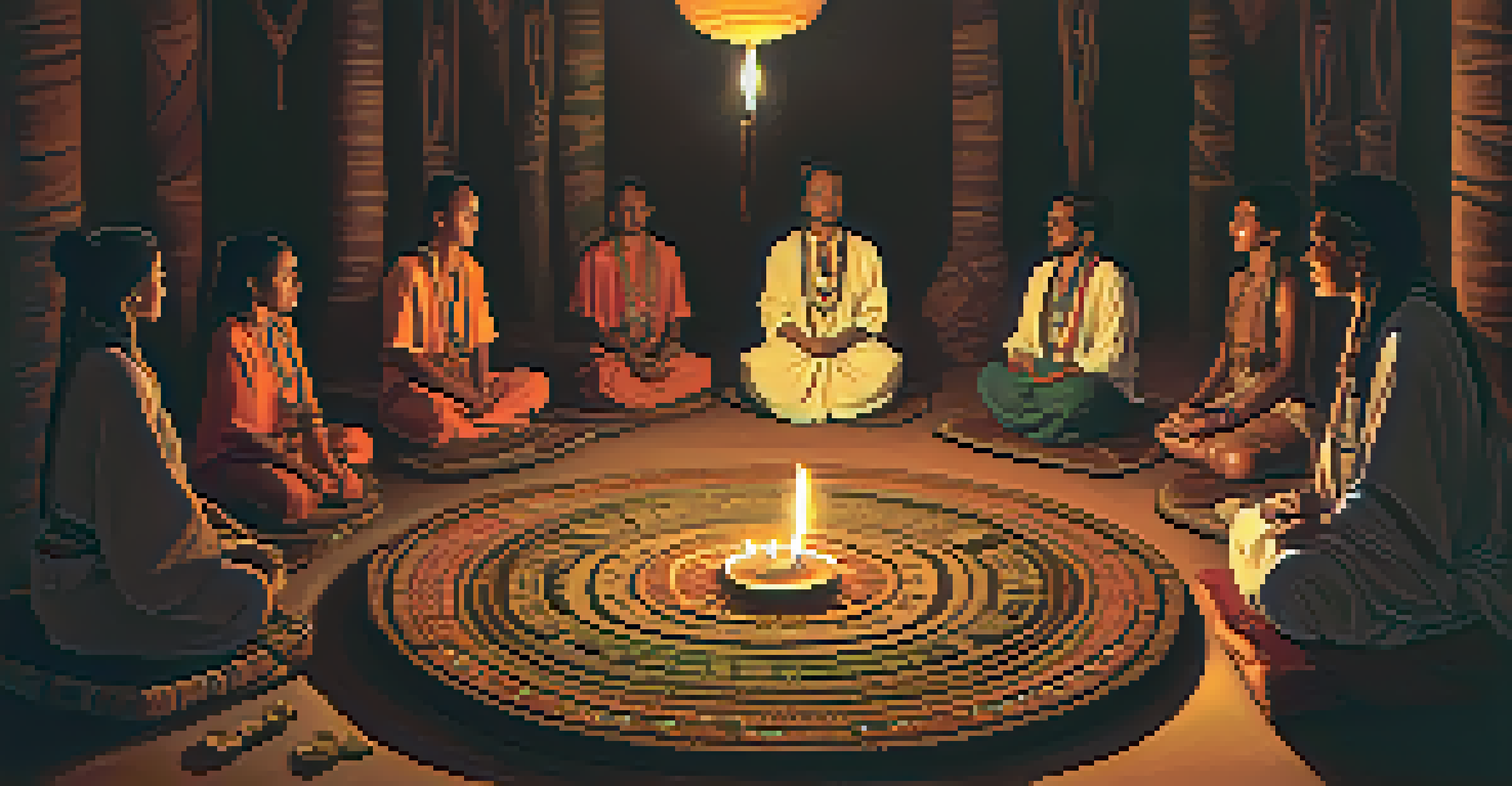Ayahuasca and Mental Health: A New Therapeutic Approach

Understanding Ayahuasca: Origins and Composition
Ayahuasca is a traditional Amazonian brew made from two main plants: the Banisteriopsis caapi vine and the Psychotria viridis leaf. This unique combination creates a powerful psychoactive experience due to the presence of DMT (dimethyltryptamine) and MAOIs (monoamine oxidase inhibitors). For centuries, indigenous cultures have used Ayahuasca in spiritual ceremonies, believing it offers profound insights and healing.
Ayahuasca can be a powerful tool for healing, but it requires respect, understanding, and integration.
In recent years, Ayahuasca has caught the attention of researchers and mental health professionals, sparking interest in its potential therapeutic effects. The brew's ability to induce altered states of consciousness may help individuals confront unresolved trauma and emotional pain. This ancient practice is now being integrated into modern therapeutic frameworks, making it a topic worth exploring.
As we delve into the therapeutic potential of Ayahuasca, it's essential to understand its historical context and cultural significance. This foundation sets the stage for examining how this traditional practice may hold keys to addressing contemporary mental health challenges.
The Science Behind Ayahuasca and Mental Health
Research on Ayahuasca has revealed intriguing findings about its effects on mental health disorders. Studies suggest that the brew may aid in alleviating conditions such as depression, anxiety, and PTSD. By facilitating deep introspection and emotional release, Ayahuasca can help individuals process difficult experiences and gain new perspectives on their lives.

One of the most compelling aspects of Ayahuasca is its impact on brain chemistry. The DMT in Ayahuasca interacts with serotonin receptors, which play a crucial role in mood regulation. This interaction has led researchers to explore its potential as a natural alternative to conventional antidepressants, offering hope for those who have struggled with treatment-resistant conditions.
Ayahuasca's Cultural Significance
Ayahuasca has been used for centuries in indigenous ceremonies, offering profound spiritual insights and healing.
However, it's important to note that while early studies show promise, more extensive clinical trials are needed to fully understand the long-term effects and safety of Ayahuasca use. As we continue to explore the scientific basis of its therapeutic benefits, we must balance enthusiasm with caution.
Ayahuasca Ceremonies: A Unique Therapeutic Setting
Participating in an Ayahuasca ceremony is a culturally rich experience that often involves a trained facilitator or shaman. These ceremonies typically take place in a safe, supportive environment where participants can explore their inner selves. The communal aspect of these gatherings can enhance feelings of connection and understanding among individuals facing similar struggles.
The healing journey through Ayahuasca is not just about the experience in ceremony; it's about how we integrate those lessons into our daily lives.
During a ceremony, participants consume the brew and are guided through their journey, often experiencing intense emotions and vivid visions. These experiences can be cathartic, allowing individuals to confront and release trauma. The setting and guidance provided are crucial, as they help participants navigate their experiences and integrate insights afterward.
It's essential for anyone considering an Ayahuasca ceremony to approach it with respect and caution. Researching reputable facilitators and understanding the process can help ensure a safe and meaningful experience, which is vital for anyone looking to explore this therapeutic avenue.
Integration: Making Sense of the Ayahuasca Experience
The integration process is a critical aspect of any Ayahuasca experience, as it involves making sense of the insights gained during the ceremony. Participants often find it beneficial to work with therapists or support groups to discuss their experiences and emotions. This step is crucial for translating profound realizations into actionable changes in daily life.
Integration can take various forms, from journaling and meditation to ongoing therapy. Each person's journey is unique, and finding the right integration method is key to maximizing the benefits of the Ayahuasca experience. Sharing stories with others who have undergone similar journeys can also provide valuable support and validation.
Therapeutic Potential Explored
Research suggests Ayahuasca may alleviate mental health issues like depression and anxiety through deep introspection.
Ultimately, successful integration can lead to lasting positive changes in mental health and well-being. By taking the time to reflect on and incorporate the lessons learned, individuals can foster growth and healing long after the ceremony ends.
Potential Risks and Considerations of Ayahuasca Use
While Ayahuasca has shown potential for therapeutic benefits, it is not without risks. Individuals with certain mental health conditions, particularly those involving psychosis or severe anxiety, may experience adverse effects. It's crucial to consult with a healthcare professional before considering Ayahuasca, especially if you're currently on medication.
Additionally, the physical effects of Ayahuasca can be intense, often leading to vomiting or purging, which some participants find challenging. These reactions, while seen as a form of cleansing in traditional contexts, can be daunting for newcomers. Understanding these potential side effects can help individuals prepare mentally and emotionally for the experience.
Being aware of these risks does not diminish the potential benefits of Ayahuasca; rather, it highlights the importance of responsible use. Engaging in thorough research and seeking guidance from experienced practitioners can help mitigate risks while maximizing the potential for meaningful healing.
Ayahuasca in Popular Culture: Growing Interest and Acceptance
In recent years, Ayahuasca has gained significant traction in popular culture, often depicted in documentaries, books, and podcasts. This growing interest has led to more people seeking out Ayahuasca experiences as an alternative form of therapy. As awareness spreads, discussions around mental health and the potential for alternative healing methods are becoming more commonplace.
The portrayal of Ayahuasca in media has both positive and negative implications. While it can inspire individuals to explore their mental health and seek healing, it can also lead to misconceptions or romanticized views of the experience. It's essential for individuals to approach this topic with a critical mindset, understanding the depth and complexity of Ayahuasca beyond its sensationalized representations.
Integration is Key to Healing
Successful integration of insights from Ayahuasca experiences is crucial for lasting mental health benefits.
As Ayahuasca continues to enter mainstream conversations about mental health, it invites deeper discussions about the role of traditional practices in modern therapeutic contexts. This cultural shift may pave the way for broader acceptance of alternative approaches to mental wellness.
Future Perspectives: Ayahuasca and Mental Health Research
The future of Ayahuasca in mental health research is promising, with ongoing studies exploring its therapeutic applications. As more researchers recognize the brew's potential, we can expect to see an increase in clinical trials aimed at rigorously assessing its efficacy. This research will be crucial in establishing whether Ayahuasca can be integrated into mainstream mental health treatment options.
Moreover, as the stigma surrounding mental health continues to diminish, there is a growing openness to alternative therapies like Ayahuasca. This shift could lead to more funding and resources dedicated to understanding the brew's effects, potentially opening doors for individuals seeking new forms of healing.

Ultimately, the intersection of ancient practices and modern science holds great potential. By bridging these worlds, we may uncover innovative approaches to mental health that honor both tradition and contemporary needs.